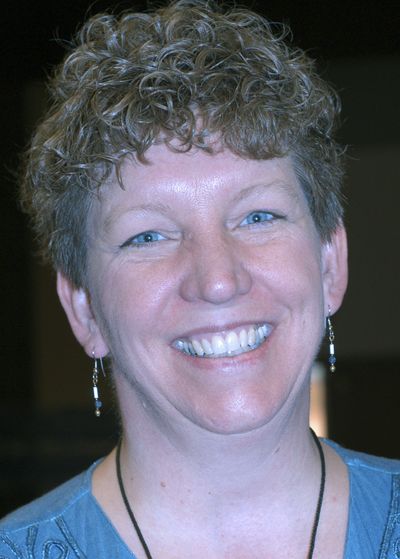Many roles to model
Metaline Falls woman juggles duties as town’s mayor, minister and theater director

As mayor, pastor and theater advisor/director in Metaline Falls, Wash., the Rev. Tara Leininger is attuned to which hat she’s wearing and when her roles overlap.
She says each role calls for the empathetic listening skills she honed in college and for knowing community concerns and resources.
“As mayor, I know people want to say something and be heard,” said Leininger, who was elected in November 2007 and began her two-year term in January 2008.
To facilitate listening, she is at Cathy’s Cafe for lunch on Thursdays, when they serve steak-and-mushroom soup. People come to talk to her about everything from dogs to administration.
“Some days I walk out of the grocery store, and someone will say, ‘I want to talk to you.’ I adjust for what hat they want to speak to,” Leininger said.
One woman told her the planters in the street were not watered enough, so Mayor Tara called the city maintenance man.
“As long as I know who I am, I’m OK,” said Leininger, who spends a quarter of her time in theater work, quarter-time as mayor and half-time as the pastor of First Congregational United Church of Christ.
“I’m also a wife, and have children and grandchildren in Idaho.”
She was wearing her three public hats when Teck Cominco in December announced a temporary closure of its Pend Oreille Mine and a layoff because of falling zinc prices.
Mine and community leaders have called a community meeting to talk about the closure and people’s fears and visions for possibilities.
Expecting that mining would not last forever, the Pend Oreille River Tourism Alliance promotes tourism – drawing people to cross-country ski, hike, fish, hunt and enjoy the natural setting – and the Tri County Economic Development District is envisioning ways to foster local business growth.
As mayor, Leininger has been talking with the manager of Teck Cominco, other area mayors and business people.
As pastor, she finds that many people have started the grieving process that begins with disbelief and moves through anger and resignation to “the other side.”
As for the theater programs, Leininger wonders how the loss of mining jobs will affect them. She hopes volunteers and participation in the theater remain strong.
Leininger and her husband, Donivan Johnson – who teaches music for the Selkirk School District – moved to Metaline Falls 18 years ago, thinking they would be there for five years. They enjoy living there and hope to stay.
In a previous economic downturn, Leininger was laid off as half-time teacher 10 years ago, became a pastor and was ordained two years ago.
She expects the community will emerge from the current downturn as it has other difficult times.
When the food bank hit hard times in recent weeks, churches spread the word, asking for dry and canned goods and cash. The community responded.
“As mayor and as pastor, I talk with people in need and know what emergency resources are available,” Leininger said.
Some miners grew up in the area, she said, while others moved there because of the mine. Many rent apartments and stay in hotels, because mining is uncertain; some brought their families and bought homes.
Job opportunities are limited, so it’s uncertain how many of the region’s population of nearly 1,000 – 258 people in Metaline Falls, 479 in Ione, 162 in Metaline and more outside the towns – will stay.
The Selkirk School District might lose 80 of about 350 students and the state funding that comes with them.
Few miners are in the churches, Leininger said. Her church and others have experienced a decline because young and middle-aged members have moved away for jobs, and older people for medical care.
Recently, she and several pastors formed the North Pend Oreille Ministers’ Association to address why only 30 percent of the people in the area attend churches and to seek ways to help them in their lives and spiritual journeys.
“Many have no tradition of church in their lives and no sense of need to be in a church,” said Leininger, who performs marriages and funerals for many of them.
One dynamic the association has been considering is how face-to-face relationships and community have declined with access to the Internet and e-mail.
“We see that many students go home and sit in front of the computer rather than visiting friends in person,” Leininger said.
The pastors recognize that church attendance is no longer the social norm, as it may have been in the 1940s and 1950s.
Leininger observed that even in that heyday, few 1950s TV characters went to church. And despite the religious themes of “Seventh Heaven” and “Touched by an Angel” in the 1970s, people preferred watching a show about angels rather than talking about angels at church.
A proponent of separation of church and state, Leininger added that being mayor does not draw more people to her church.
Sometimes her roles overlap. Invited to the Veterans’ Day Dinner at the American Legion as mayor to honor volunteer firefighters, she was asked on arriving to bless the meal as the pastor.
“I pray often for guidance for each role I’m in, but do not lead prayer at city council,” she said.